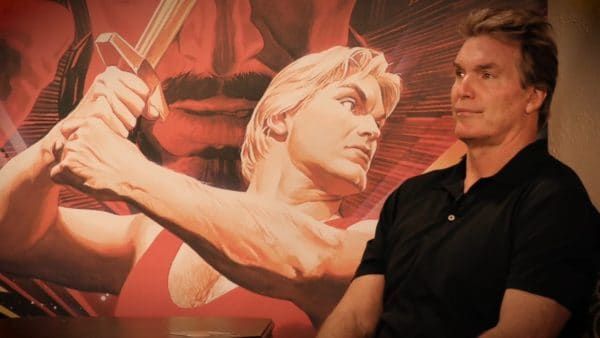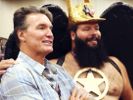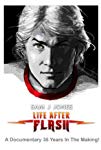Eye For Film >> Movies >> Life After Flash (2017) Film Review
Life After Flash
Reviewed by: Andrew Robertson

There are lots of entertaining moments in Life After Flash, not least among them a series of impressions of legendary film producer Dino De Laurentis. Those light-hearted recreations sit within a film that's got the odd revelation, a fair few bits of Flash Gordon and behind the scenes footage, and - as much because of as despite the involvement of its subject - a marked degree of honesty.
Sam J Jones was Flash Gordon, all the way back in 1980. It's a film whose influence is still felt, one that featured a frankly ludicrous cast, and Queen's second best set of contributions to a soundtrack. Sam was new to acting though, to the whirl of Hollywood, and though unnamed and unseen advisers are credited with the decision he takes ownership for picking a fight with Dino. It's one he lost, to the extent that it's not his voice on the screen. Like Dave Prowse, however, he's had a later career that sees him attending fan conventions on a regular basis, and like Prowse, he's also made money from helping people cross safely. Not roads, however, but the Mexican border, as in a move best described as a sharp pivot he now regularly serves as a bodyguard for VIPs travelling south from the US.

It's crowdfunded, and there are long lists of names in the credits, but here's a set for you, in no particular order: Patrick Warburton, Paul Oakenfold, Topol, Deep Roy, Alex Ross, Rich Fulcher, Mark Millar, Brian May, Jon Heder, Lour Ferrigno, Stan Lee, Ray Park, Robert Rodriquez, Richard Donner, Mike Hodges, John Altman, Richard O'Brien. They've all got interesting contributions, and they're not alone. Chris McDonald (you'll recognise him from something, he's got hundreds of credits) is linked with Thelma And Louise but that does a disservice to his roster of roles. Peter Duncan not only appears, but he fixes something on screen and there's something he prepared earlier. Speaking of catchphrases, there's Brian Blessed. Yes he does. More than once. He also says 'fuck', and more than once, but he does ask permission. He also does a pretty good Max von Sydow impression, and that's before the one that might be treasonous.
There are other, potentially more interesting but potentially problematic bits of interview. Some of those were caught at comic-cons, there's red carpet footage from the premiere of Ted 2, but we never actually get an interview with Seth MacFarlane. Former Marilyn Manson bassist Twiggy Ramirez (Jeordie White) contributes too, and I mention that because while Sam J Jones is open about his struggles and also the toxic nature of some of his relationships with women, he's far from alone. That might be an issue for some. The Jones family, families, contribute, as do friends, but there's not much sugarcoating.
There's definitely nostalgia. Even as elements of behind the scenes footage look forward to Sam's turn as the villain in Axcellerator, there's an extended section looking at what was happening behind the scenes of Flash Gordon. Brian May's contributions there are good, understandably, but a throwaway line from the film's director about why he was chosen sheds unexpected light on De Laurentiis' working methods. Melody Andersen has a lot to contribute too, though there's a weird note with her booths at the various conventions always being beside Sam's and also seeming to be empty...
Lisa Down's film is a lot of fun - the sheer variety of locations and interviewees means that assembling this into a cohesive narrative must have been difficult (shades of the improvisatory aspect of the film that gave Jones his shot), and while it's largely successful there were maybe issues with basic technical things like sound levels. Being able to see the joins is part of the fun, however, even if it's also clear that many of those involved in Flash Gordon disagree as to its intentions and receptions. High camp might work for the mountaineer Brian Blessed but perhaps not in every sense. So too the documentary, which assembles a huge volume of interesting people and interesting anecdotes to usually interesting effect, but could perhaps have done with more careful curation, a clearer route through its intents. I was minded of Chris Rock's documentary Good Hair, with similar multiplicities on what amount to linked subjects - this too is as much anthology as anthropology.
There are interviews with collectors. Martha De Laurentiis' office has Funko Pop figures of Will Graham and Hannibal Lecter mint in box in the background, and there's a good discussion of the posters with Renato Sanches (like Drew Struzan, you'll recognise the work if you don't recognise the name). Indeed, the presence of completists and super-fans is helpful, because you do not need to be either to enjoy Life After Flash. Sam J Jones is a charming cove, and while I might argue with the contention that the character of Flash Gordon is "the father of all superheroes" (John Philip Wylie's Gladiator has him beat by six years, to name but one) I'm difficult on purpose. Others like me are interviewed - see in particular a discussion of the button marked HOT HAIL. It's not without the odd stumbling block, and some of those will cause certain audiences more issues than others, but it's certainly well-intentioned, and for the most part well done - as such, I'd expect it to be well received. You'd expect as much, after all, from even an egg thrown by a star quarterback.
Reviewed on: 27 Jun 2018
















